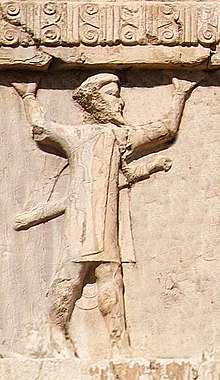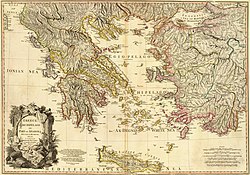
Back İoniyalılar AZ Іанійцы BE Йонийци Bulgarian Iónové Czech Joner Danish Ionier German Ίωνες Greek Ionoj (popolo) EO Joniarrak EU ایونیها FA

| History of Greece |
|---|
 |
|
|
The Ionians (/aɪˈoʊniənz/; Greek: Ἴωνες, Íōnes, singular Ἴων, Íōn) were one of the four major tribes that the Greeks considered themselves to be divided into during the ancient period; the other three being the Dorians, Aeolians, and Achaeans.[2] The Ionian dialect was one of the three major linguistic divisions of the Hellenic world, together with the Dorian and Aeolian dialects.
When referring to populations, "Ionian" defines several groups in Classical Greece. In its narrowest sense, the term referred to the region of Ionia in Asia Minor. In a broader sense, it could be used to describe all speakers of the Ionic dialect, which in addition to those in Ionia proper also included the Greek populations of Euboea, the Cyclades, and many cities founded by Ionian colonists. Finally, in the broadest sense it could be used to describe all those who spoke languages of the East Greek group, which included Attic.
The foundation myth which was current in the Classical period suggested that the Ionians were named after Ion, son of Xuthus, who lived in the north Peloponnesian region of Aigialeia. When the Dorians invaded the Peloponnese they expelled the Achaeans from the Argolid and Lacedaemonia. The displaced Achaeans moved into Aigialeia (thereafter known as Achaea), in turn expelling the Ionians from Aigialeia.[3] The Ionians moved to Attica and mingled with the local population of Attica, and many years later emigrated to the coast of Asia Minor founding the historical region of Ionia.
Unlike the austere and militaristic Dorians, the Ionians are renowned for their love of philosophy, art, democracy, and pleasure – Ionian traits that were most famously expressed by the Athenians.[4][page needed] The Ionian school of philosophy, centered on Miletus, was characterized by a focus on non-supernatural explanations for natural phenomena and a search for rational explanations of the universe, thereby laying the foundation for scientific inquiry and rational thought in Western philosophy.
- ^ Darius I, DNa inscription, Line 28
- ^ Apollodorus I, 7.3
- ^ Pausanias VII, 1.7
- ^ Kōnstantinos D. Paparrēgopulos, Historikai Pragmateiai – Volume 1, 1858